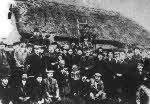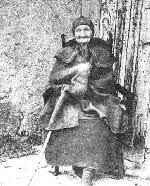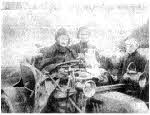|
The following is a description of Johannes Kleinpaul, who lived in this era, and visited the old lady, Jantjemöj. He wrote a very clear account of her life in the Marsh Colonies at that time.
(Jantje spoke East Friesen Low German (Platt). What she told has been put in English in a general translation form in parentheses)
[Explanations and notes I put in brackets].
Jürgen Adams
Jantjemöj from the marshes
by Johannes Kleinpaul
We had an enjoyable journey to Vossbarg. From there we had to go a ways by foot to Jantjemöj, because there was only a path to her cottage.There were three farmer’s wives that asked in astonishment only: “All to Jantjemöj” nd pointed in the general direction. They acknowledged that there had been other visitors there today! By their tone of voice, you could tell they were jealous, thinking the only reason she was having so much company was because of her very advanced age.
Twenty years ago when she was still strong on her legs like all other grandmothers in Vossbarg, not a soul asked about her. Now that she has reached the age of one hundred, her birthday brought her popularity. Now that she is over one hundred, she is popular! From all over East Friesland, she receives visitors, even in Summer and Winter. Even many that have found their new home in the new world [America], spent a day to visit her, before they returned over the ocean.
Now we can see her little cottage, alone and far away by itself, alone on the quiet bogs (Marsh), standing in front of an endless flat field of red gleaming heather. It is a very humble abode, constructed of reed and loam ( similar to a sod house on the American prairie) in size it is 10 Schritt long and 4 Schritt wide ( approximately 30 foot x 12 foot) in the same style of the larger farm places. It has a chimney on the north gable and the lean-to roof extends down so low that a four year old child could touch it.
 Here lives the elderly lady with her little spitz dog.-.all by herself and alone. She draws rainwater every day from an open cistern, and daily builds a fire in her fireplace. As recent as last year, she planted two acres of potatoes, and dug them herself. Through the little door you enter into a narrow hall. Her required tools are standing there, and you see the narrow little staircase leading to the attic, where peat is stored. From there we go into the larger room of the cottage, where she lives and sleeps. On the outside wall is the old fireplace, constructed from stone, and on the small south wall, beside the door is the ancient humbly constructed bed cupboard. The aged lady, by now used to the attention paid to her, sits by the window, constructed of small pains of inexpensive glass. The windowsill has a small glass with gentian flowers on it. She is not ashamed of her simple and humble way of life, and shows it. Here lives the elderly lady with her little spitz dog.-.all by herself and alone. She draws rainwater every day from an open cistern, and daily builds a fire in her fireplace. As recent as last year, she planted two acres of potatoes, and dug them herself. Through the little door you enter into a narrow hall. Her required tools are standing there, and you see the narrow little staircase leading to the attic, where peat is stored. From there we go into the larger room of the cottage, where she lives and sleeps. On the outside wall is the old fireplace, constructed from stone, and on the small south wall, beside the door is the ancient humbly constructed bed cupboard. The aged lady, by now used to the attention paid to her, sits by the window, constructed of small pains of inexpensive glass. The windowsill has a small glass with gentian flowers on it. She is not ashamed of her simple and humble way of life, and shows it.
”Nu kaamt man gau in d' Köken!" (Now come quickly in the kitchen)
She welcomes us heartily. Then she turns to the fireplace, where the teakettle is hanging on an iron hook, and says thinking out loud:
”Nu is 't Für haast ut, annes wull 'k Jo noch wolI'n Koppke Tee maken"
(Now the fire is out, otherwise I would make you a cup of tea). She had poured all the hot water in her jug, that she was going to take to bed with her.
"Wat sün Ji vör Volk, wo hör Ju binanner?" ( Then she asked: ”Who are you, who do you belong to)
[ The explanation of who is related to whom and how, is still a used form of conversation among the elderly today. Sample: This is a cousin of A, a brother-in-law of B, who is possibly related to the one asking the question.]
As she heard that my companion was from Moorlage, she perked up:
"Wat, du büst ut Moorlage? Un nu wohnst heel in Emden? In Moorlage hett mien Bröör Marten ja wahnt, de is nu al doot."
(“What? You are from Moorlage? And now you live way in Emden? My brother Marten [Brinkmann] lived in Moorlage, but he is long dead.”) At this moment, she noticed, that we look to her and her clothing and she said:
 "Vandaag bün ik nich moi, man sünst sünndags dann sett ik mien Hüll up, dann seggen de Lüü allmetts, Jantjemöj lett noch nett as 'n jung Wicht." "Vandaag bün ik nich moi, man sünst sünndags dann sett ik mien Hüll up, dann seggen de Lüü allmetts, Jantjemöj lett noch nett as 'n jung Wicht."
(Today, I’m not pretty, but on Sunday I put on my good cloths. Than the people all say, that Jantjemöj still looks like a young girl!)
A young lady said that she recognized her from a postcard picture, she (Jantjemöj) didn’t now that such a postcard existed.
"lk will jo een stüren",
(“I will send you one,”) said the young lady.
"Denn moots hum man 'n goden sekern Keerl mitgeven, 'n Schipper of so, anners kunn 'k hum woll nich kriegen, denn holl'n se hum."
(”Than you must give it to a good man, like a sailor, otherwise I might not get it, they might keep it!” Thought Jantjemöj.
When the same young lady asked her if being alone in her old age, especially in the fall, didn’t bother her, she looked at us with reproach and said:
"Alleen? De leev Gott is noch alltiet bi mi west."
(“Alone? My loving God has always been with me!”),
”And so you want to continue to stay here?”
"Jawoll, wenn ik nich weer trau'n kann, moot ik ja woll"
“Of course, if I can’t get married again, I have to!).
And with a smile she continues:
"Man mi sall ok woll kien een mehr hemmen willen, ik hebb kein Tann of Kuus mehr in d' Mund."
("But nobody would want me anymore, without teeth in my mouth.")
Than she turned again to her friend from Moorlage:
"Man nu segg, wo olt b"st du denn?"
( "Now tell me. How old are you?")
"Negenunfievtig."
( "Fourtynine")
"Ach dat is ja noch man'n Humioller, kannst noch nich mitproten
("You aren"t even old enough to carry on a conversation" she said laughingly).
"lk weer do in mien beste Johrn un mu" de hele Winter na't Moor hen to hacken"
("When I was your age, I was in my best years, and had to go to the bogs and rake")
Now we ask her about her experiences in her long life. The most interesting events were in her youth.
When the French occupied the area in 1812, they captured her father when he was with his peat hauling ship in Emden. He and many other East Friesens were taken to Toulon in France.
At this time, young Jantje made her farthest journey from home, to bring back the ship.
It took two years, before her father was released ( by the France ).
"Man dat weer'n Bliedskupp, as Vader weerkweern, wie hebbt all rast
("Boy that was a happy day, when father returned we celebrated with joy!!! ")
"Ja, ik heff vööl beleevt, min Vader is fröh stürben, mien Moder bleev mit'n Huus vull lütje Kinner sitten, ik bün neet vööl na de Schole henkomen",
("Yes I have experienced much, my father died young and my mother was left alone with a lot of little children. Therefore I didn"t get to go to school a lot.")
" Lesen hebb ik lehrt, aber neet schrieven, ik moot up de Lüttjen passen.".
(" I learned to read, but not to write, I had to take care of the little children.")
"Mien eerste Stee was bi'n Jöde in Auerk, de muchen mi geern lieden, mal sä de Fro an mi: Jantje, ik wull, du harrst uns Glove, denn wüss ik för uns Söhn keen beter Fro as di".
(" My first job was working for a jewish man in Aurich. They liked me a lot. Once his wife said to me: "I wish you were of our faith, then I would know of no better wife for our son, than you." ")
"Man dat harr'k noit daan, wenn ik nü ok noch so goot setten kunnt harr, na en Glove, wor'k to sworen harr, wull'k ok hollen.
Man! I wouldn’t have done that"".. even if I would have had it so good. To my belief I had sworn, and would remain true.
"lk hebb en goden Mann hatt, BalsOhm de is nu ok al doot, siet teihn Jahrn, man unse golden Hochtiet kunn' wie noch maken.
("I had a good man, BalsOhm [ which is a nickname. Saathoff was his family name, but he was known primarily as BalsOhm ] He has been gone for 10 years, but we were able to make our golden anniversary.")
"Fieftig Johr, dat is 'ne lange Tiet, wenn man se vör sük liggen sücht, dat is 'ne körte Tiet, wenn man se sücht van achtern an, se sünd to lang, um se to verlehren, se sünd to kört um uttolehren".
(" 50 years is a long time,". if it stands ahead of you,".. and it is a short time if it is behind you. The time is too long, to forget and too short to learn all.")
"Un ik hebb ok goode Kinner, se hebben goot wat lehrt, dat harr ik mi vörnomen, de Kinner sullen na de School un wenn ik de Boken ok börgen musst harr".
("And I had good Children; they learned well, that was my goal........ that they should go to school. Even if I had to borrow the books.")
"As uns ollste Jung bi de Buur was, kwamm de Buur bi uns uns: “He maakt sük goot, sall he dat anner Jahr bi mi blieben'? Nu, BalsOhm was't recht, mi was't recht, he bleev".
("When our oldest son was working for the farmer, the farmer came to us and said: "He is doing well, should he stay another year with me? Now it was all right with BalsOhm and it was all right with me, he stayed.")
"Do kummt unse Jung ins up'n Sünndag up Besöök, ik maak mit hum en Keierpaddje bi de Rogge langs, he was so still."
("Once our son came to visit on a Sunday. I walked with him along the rhye field. He was very quiet.")
"lk doch, Watt hett uns Harm wall, düürt noch en Settje, do sä he: 'Moder, de Maid, de bi uns deent, de kummt van mi in de Weken'.
("I thought, what is wrong with our Harm. After a while he said: " Mamma the hired girl that works with us is pregnant and I did it.")
"'t was as wenn ik de Sprake verlor, man do sä'k an hum: 'Wenn du dat Wicht schändt hest, dann sallst du hör ok ehren, meenst du dat naher Kinner van BalsOhm un Jantjemöj bi de Weg liggen sülen, de neet weten, wat hör Vader is?"
("I was speechless, than I said to him: " If you have shamed her, than you must honor her."
"Do you think that later on grandchildren of Jantjemöj and BalsOhm should lie in their cradle and not know who there father is?"
In the mean time we noticed the hour.
It was late for us, and especially late for Jantjemöj, because she normally ended her day at 4:00 p.m.
Another person, that came earlier, and knocked at the same time, got Jantjemöj out of bed, because he told her, that he had brought a nice present from Santa Claus. Then she moved the pail and other household equipment that she had barricaded the door with, to keep out robbers.
"Dat mi dar nachts kien Räubers und süks Schojerpack inbreckt."
("So that robbers and thieves and the like couldn"t break in.")
As we were leaving, we pressed some money in the hand of the unusual elderly lady.
"Mag je got gahn, heiraat bold, Gott mag sien Segen darto geben".
("May it go good with you, marry soon, and may God bless you.")
So we left with an experience of stepping back in time out into the beautiful fall evening and we picked a sprig of heather as a remembrance of Jantjemöj.
Strangely this lady who has walked the earth so much longer than thousands of others, had not seen so much as a train in her youth, and now that there is one as close as Bagband she is unable to walk there to see it.
Since the mouse does not go to the mountain, the mountain comes to the mouse. The regional president of Aurich sent her a telegram congratulating her on her 100th birthday.
 On a phonograph cylinder she spoke in her firm seldom heard dialect. Occasionally an automobile stops in front of Jantje Moeh"s cottage, seating the ancient lady in the car and take a picture of her. On a phonograph cylinder she spoke in her firm seldom heard dialect. Occasionally an automobile stops in front of Jantje Moeh"s cottage, seating the ancient lady in the car and take a picture of her.
With these experiences and thoughts we went back through the marsh, till we reached our landau coach.
|